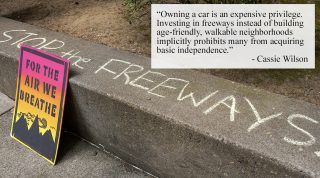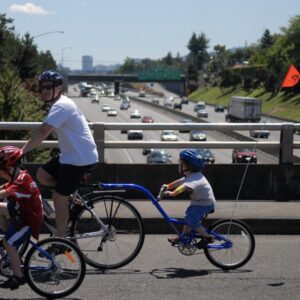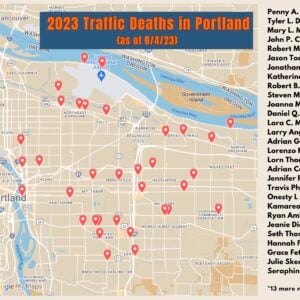“For me, true independence will come not from a driver’s license, but from Oregon building a transportation system that allows every Oregonian the chance to get around without an automobile.”
— Cassie Wilson

(Photo courtesy Cassie Wilson)
By Cassie Wilson, a 22-year-old resident of Clackamas County.
This spring, I celebrated getting my driver’s license, knowing it meant I could independently leave my neighborhood for the first time in my life. I can’t help but wish navigating my community wasn’t entirely dependent on traveling by car.
I am 22 years old. Because of a disability, coupled with a lack of nearby transit and sidewalks, I’ve been completely reliant on someone driving me wherever I need to go. I wasn’t interested in driving, but I knew it was the only way I’d be able to get a job or a higher education. Access to an automobile shouldn’t be a prerequisite for participating in society, but in almost all of Clackamas County, we simply haven’t invested in alternatives.
As someone who experiences firsthand the limitations of our existing transportation options, it’s disappointing to see elected officials continuing the status quo by prioritizing freeway expansions over investments in transit, road maintenance, or safer streets. That’s why I urge you to join me in opposition to House Bill 3055, which would create a slush fund for the Oregon Department of Transportation to spend hundreds of millions expanding I-205 and I-5 in Clackamas County by bonding against expected toll revenue.
Owning a car is an expensive privilege; automobility is a luxury that comes and goes with age and ability. Lacking a car shouldn’t prohibit anyone from commuting and accessing health care or education. Investing in freeways instead of building age-friendly, walkable neighborhoods implicitly prohibits many from acquiring basic independence. Even with my new license, I’m caught in a vicious cycle of needing a job, needing an education to get a job, and needing to pay for a retrofitted accessible vehicle to physically access either. How am I, a young disabled person living off SSI’s $529 per month, supposed to pay thousands for a vehicle conversion?
Advertisement

It’s not just that widening freeways robs us of investing in transportation that actually meets my needs – widening freeways robs my generation of a hospitable future. 40% of Oregon’s carbon emissions come from transportation, and in 2019, Clackamas County set the goal of carbon neutrality by 2050. After the wildfires at our doorstep last fall, I don’t know how anyone could deny the urgency with which we need to dramatically lower emissions.
With these crises looming, why are elected officials still proposing to throw hundreds of millions of dollars into widening several miles of freeway that will only exacerbate the problem? We don’t have to wait for the completion of the county’s climate action plan to know that making more room for cars won’t address this emergency. Besides, freeway expansion has literally never solved congestion; it’s baffling ODOT pretends otherwise.
How could we instead invest in solutions that benefit our climate and our community? Clackamas County could instead have reliable and accessible transportation options for people of all ages, for those who cannot afford to own a car, and for those who would gladly walk their children to school with safer streets and sidewalks. We should invest in both the safety of our neighbors and protect the place we call home.
It’s clear that the proposed freeway expansions in HB 3055 won’t solve our problems but will rob us of desperately needed revenue for road maintenance and safety improvements while literally stoking the flames of the impending climate crisis. It’s not too late for our elected officials to push a different direction and invest in alternatives.
For me, true independence will come not from a driver’s license, but from Oregon building a transportation system that allows every Oregonian the chance to get around without an automobile. To get there, we must stop widening freeways and instead invest in transportation options.
HB 3055 is up for a work session today (Monday, 6/21) in the Joint Ways and Means Committee.
— Cassie Wilson is on the Clackamas County Youth Advisory Task Force on Climate, but speaks only for herself. She lives in Boring.
— Get BikePortland headlines delivered to your inbox.
— Support this community media outlet with a one-time contribution or monthly subscription.







Thanks for reading.
BikePortland has served this community with independent community journalism since 2005. We rely on subscriptions from readers like you to survive. Your financial support is vital in keeping this valuable resource alive and well.
Please subscribe today to strengthen and expand our work.
Nah, keep it going full bore. Portland is full of slush funds with no accountability and no performance metrics. Why not one more? Here they are:
1. Portland Clean Energy Fund$41-61 million per year
2. Homeless Initiative 26-210 (Good idea, horrible plan) $248 million per year
3. Portland pre-school Measure $132 million per year
4. City council funding of private non profits ($3 million just added)
5. Portland Parks Levy $48 million per year. Much of this not being used for actual parks cleanup or maintenance as promised to voters with no accountability.
You make sweeping statements without backing them up. Those programs don’t match your prioities or meet your needs, fair enough. That doesn’t mean there aren’t people hard to meet real needs in the community, using that money.
…working hard…
Outstanding piece.
While admirable that this young millennial put together a well thought out opinion piece, reality is that until society wants to accept a zero sum sustainable lifestyle when it comes to climate nothing will change. How many climate activists will place orders for discounted products on Amazon Prime Day today? How do you think those products got delivered to Amazon distribution warehouses & to your home? You guessed it, using. ODOT freeways, county roads, and city streets. Same goes for your local Trader Joe’s, Zupan’s, bicycle shop, or any other product you purchase & consume. Reality bites you in the backside once you get out of your philosophical bubble.
Fuzzy Blue Line, I totally disagree with this line of thinking. I hear it a lot and this type of shaming is really not helpful or cool at all in my opinion. Sure, let’s hold people accountable for the choices they make, but I would rather support people trying to change the sucky system rather than criticize how they are a part of it/victimized by it.
Yes, if someone is pontificating about how clean and green they are, but their choices don’t line up with that at all, I’m all for pointing that out. But it’s almost impossible/infeasible to live in this society/system in America and not be implicated/involved in some bad shit. So instead of throwing out the baby with the bathwater, I’d rather do everything I can to make sure that baby is safe and won’t drown.
I don’t think FBL is “shaming” anyone with his/her comment. Rather, FBL is pointing out that, when viewed from the larger perspective, we are all complicit. Admitting to being part of the problem is the first step….
OK thanks. Sounded like shaming to me. And yes we are all (or very close to all) complicit in some ways. Let’s please move on and work together and keep our eyes on the prize!
I see why you called it “shaming,” because the argument in the post is (based on the intent of the drafter) either: (1) you are a hypocrite for contributing to the problem you are complaining about, and therefore your concern is unjustified (ie shaming); or (2) it’s pointless to try this type of fix when the underlying behavior won’t change; or both.
Neither argument makes any logical sense. The first argument is an Ad Hominem attack and therefore without substance. I would add that it appears to be based on little if any understanding of the author’s behavior or what the author actually said about the author’s use of the roads.
The second argument is the one that is a favorite of the US Right. It is this: The problem is big and complex. Your proposed solution would not be sufficient to solve the entire problem it is intended to address on its own. There are other aspects of the problem that are not addressed by your proposed action, and therefore the problem will continue regardless. Therefore, your proposed action is pointless and should not be tried.
This is a logical fallacy. And an obvious one, indicative of poor thinking. In this substantive context, it is already known that making driving a less attractive option for everyone (eg, by not adding freeway capacity) can change individual behavior (eg, by causing people to consolidate trips, use transit, even get on a bike, etc). Thus, in addition to being logically inadequate, this view is also proven wrong.
“we are all (or very close to all) complicit in some ways”
This really sticks in my craw because the average Portlander is enormously more complicit than the average person on a global level.
“The prize”
If beginning to address ecocide is the prize then Portlanders need to stop shutting down discussion of consumption emissions as “shaming”. This unwillingness to acknowledge the largest source of Portland’s CO2e emissions is not only self-serving but also a major justification for inaction.
IMO, the rational response to bad faith “whataboutism” is not to become defensive about consumption but to agree that we need to dramatically reduce rampant extractive consumer-capitalism (Fordism) AND freeway expansion (also Fordism).
Surely you must have figured out by now that a sea change in society to reject extractive consumer-capitalism is never going to happen. It can’t happen without some alternative created by an organized effort, and efforts like that are contrary to the interest of the establishment, and consequently crushed routinely. The system is too powerful and entrenched to dismantle itself.
The only hope for that kind of change is for this system to hurtle off the cliff and destroy itself, which it will soon do on its own. Soon, the summer temperatures will be too hot to grow crops, and mass starvation will be the result.
People living in disgustingly wealthy northern nations (and cities) will be the least affected by ongoing ecocide so this kind of nihilism is not only scientifically illiterate but also a form of neocolonialism.
Why would you throw out bathwater? I tend to drain my bathtub instead, part of the internal plumbing of my apartment. Is this some sort of new Portland fad in water conservation?
Why are you NOT diverting this graywater for other uses?
“Yet you participate in society. Curious! I am very intelligent.”
Perfect. Mister Gotcha.
Kind of a good metaphor for cancel culture, too.
No. So-called “cancel culture” is people voting with their dollars in the marketplace. This is just ignorance by people who believe they are smart. Totally different things.
Others countries have transportation systems where living without a car is considerably easier than it is in most of the US, and yet residents of those countries also have access to consumer goods, groceries, etc.
Right. Also, Amazon’s labor practices and the way they deal with authors and other suppliers are well known and many people choose not to deal with them.
Profound piece. Thank you!
The claim that officials are “prioritizing freeway expansions over investments in transit, road maintenance, or safer streets” is simply NOT TRUE. It’s not even close. Take a look at the ODOT Budget. ODOT’s Budget Request (Biennial for 2021-2023) has nine major categories as follows:
Maintenance $575 million
Preservation $446 m
Bridge $494 m
Local government [pass-through funds] $303 m
Special Programs $537 m
Operations $436 m
Modernization $142 m
Maybe a bit of the evil “freeway expansions” comes from Bridge or Preservation, but most probably comes from Modernization. But, there’s no way the amount for freeway expansions (which is only a portion of Modernization) is more than the individual expenditures for Maintenance, or Operations, or the pass-through to Local Government.
I get that people are opposed to freeway expansions (even if there are substantial expenditures for improvements to the local street system as part of those projects), but you should at least present the facts about the actual expenditures.
And here are the project costs produced by ODOT themselves (go ahead and add 10-20% in cost overruns):
Rose Quarter (lanes addition): $715m-$795m
Interstate bridge (widens more than bridge): $750m-1B
Abernethy Bridge (replaces and widens bridge): $410m-$460m
I-205 widening (adds additional lane in each direction): $190m-$240m
Operational projects (likely auxiliary lanes): $550m-$700m
Boone Bridge replacement: $450m-$550m
Source: https://www.oregon.gov/odot/Get-Involved/OTCSupportMaterials/Agenda_F1_UMO_Update_PPT.pdf
It helps your story that ODOT is all about freeway expansion to list Abernethy Bridge and Boone Bridge. There may, in fact, be lanes added with the bridge replacement projects, but the projects were initially developed based on the need for seismic upgrades. Maybe if you are anti-freeway, you’d prefer that the bridges just shut down rather than undertake a seismic upgrade.
The link that you helpfully provided also makes clear that construction is planned several years out on many of them.
The bridge program in the STIP that you listed above is primarily used for fixing existing bridges, not building new ones. If Abernethy and Boone need a seismic upgrade that can be done without building a new bridge that is wider. There are no shortage of bridges that need upgrades around this state. Abernethy is moving forward because they want to add a third lane on I-205. Boone is moving forward because state legislators get annoyed that they have to sit in traffic in Wilsonville on their way to and from Salem.
Another way of saying what you said, is that as much as the Oregon legislature and governor want to expand freeways and spend accordingly, they haven’t actually been able to pull it off since 1997 (or is it 1992?) for highway 217, an expressway; I-205 is even older. The CRC was cancelled, the RQ is uncertain and long-delayed, and CRC2 is even more contentious. Given Oregon’s habit of debating everything to death, I figure the next major recession will kill off both RQ and CRC2. While it’s not really part of ODOT’s budget, but does vastly affect transportation budgets statewide, the payroll tax for transit is an indirect funding mechanism for transit in Oregon that allows ODOT to ignore transit and focus on highways.
Meanwhile, your next door neighbor Washington actually does continue to expand freeways.
Good points. I also forgot to list the $134 million the legislature gave ODOT to spend on 217 auxiliary lanes. I guess it isn’t any surprise the legislature is good with dedicating toll money to do the megaprojects they would otherwise be keen to fund with general funds.
So your argument is that, because the amount spent for freeway expansions is less than the amount spent on transportation infrastructure other than freeway expansions, the Legislature is not “prioritizing” freeway expansion? That just doesn’t follow.
Cassie made the point that the share of revenue available to pay off construction bonds is being committed to roads for motor vehicles.
No junkie ever cleaned up by having bigger veins put into their arms.
Comment of the week, IMO.
Some people perceive a car as a source of freedom. I see it as (un)necessary evil. As Cassie says, cars are expensive. When you have a tight budget, you can’t afford a reliable car, so that makes the car more expensive. Allowing society to become dependent on cars really drives the materialist agenda in the western world.